- Home
- Steve Erickson
Full-Blooded Fantasy
Full-Blooded Fantasy Read online
This book is a work of fiction. Any references to historical events, real people, or real locales are used fictitiously. Other names, characters, places, and incidents are the product of the author’s imagination, and any resemblance to actual events or locales or persons, living or dead, is entirely coincidental.
Simon & Schuster Children’s Publishing Division • 1230 Avenue of the Americas, New York, NY 10020 • The Sea of Trolls copyright © 2004 by Nancy Farmer • The Water Mirror copyright © 2001 by Kai Meyer • Spiderwick Chronicles: The Field Guide copyright © 2003 by Tony DiTerlizzi and Holly Black • The Conch Bearer copyright © 2005 by Chitra Banerjee Divakaruni • The Farsala Trilogy: Fall of a Kingdom copyright © 2003 by Hilari Bell • Pendragon #6: The Rivers of Zadaa copyright © 2005 by D. J. MacHale • Clemency Pogue copyright © 2005 by JT Perry • May Bird and the Ever After text copyright © 2005 by Jodi Lynn Anderson; illustrations copyright © 2005 by Leonid Gore
All rights reserved, including the right of reproduction in whole or in part in any form.
This book contains excerpts from books previously or soon to be published individually by Simon & Schuster Children’s Publishing Division.
ISBN: 1-4169-1297-5
Visit us on the World Wide Web:
http://www.SimonSays.com
SELECTIONS FROM
The Sea of Trolls
by Nancy Farmer
DARK REFLECTIONS
Book One: The Water Mirror
by Kai Meyer
May Bird and the Ever After
by Jodi Lynn Anderson
THE SPIDERWICK CHRONICLES
1: The Field Guide
By Tony DiTerlizzi and Holly Black
Clemency Pogue: Fairy Killer
by JT Petty
illustrated by Will Davis
The Conch Bearer
By Chitra Banerjee Divakaruni
THE FARSALA TRILOGY BOOK 1
Fall of a Kingdom
by Hilari Bell
PENDRAGON
Book Six: The Rivers of Zadaa
by D. J. MacHale
THE SEA OF TROLLS
by NANCY FARMER
The year is A.D. 793. Jack and his little sister, Lucy, are enslaved by Olaf One-Brow and his fierce young shipmate, Thorgil. With a crow named Bold Heart for company, they are swept up into an adventure that will not be forgotten. This New York Times bestseller from award-winning author Nancy Farmer tells one boy’s story of outwitting all expectations.
NANCY FARMER has written three Newbery Honor Books: The Ear the Eye and the Arm; A Girl Named Disaster; and The House of the Scorpion, which in 2002 also won the National Book Award. Other books include Do You Know Me, The Warm Place, and three picture books for young children. She grew up on the Arizona-Mexico border, and now lives with her family in Menlo Park, California.
Visit www.SimonSaysKids.com for more on The Sea of Trolls, including a downloadable screensaver, an interview with Nancy Farmer, and a reading group guide.
A Richard Jackson Book
Atheneum Books for Young Readers
New York • London • Toronto • Sydney
Chapter Ten
OLAF ONE-BROW
Jack sat in a hollow near the Roman road. He was surrounded by bracken like a rabbit hiding from a fox. No one would be able to see him, but Jack intended to be even more invisible. He breathed in the green odors of earth and fern. He felt with his mind the damp roots of trees. Come forth, he called. Come forth to me. Cloak the air with your gray presences. Bring sea and sky together.
He felt, rather than saw, the curling mist. Sunlight muted to pearl white, to dove feather and dusk. Dampness flowed into his lungs. Water gathered on ferns. Round drops paused on the tips of leaves and fell, sending pale threads over moss. The air sighed and rustled with it.
He had never been so deep in the life force. He swam through it like a minnow, like a woodland creature with no more thought than to be. It was enough. It was more than enough. The glory and wonder of it swept him on.
“Jack…Jack…”
The voice reached him from a great distance. He turned from it, unwilling to become human again.
“Jack…oh, please! I’m so cold and scared!”
He came to his senses. For a moment he was filled with unreasoning anger. How dare anyone disturb him!
He heard gulping, hiccuping cries that cut him to the heart. It was Lucy! She was nearby but hidden by a fog so thick and heavy, it frightened even Jack. He’d really outdone himself this time. “Lucy, I’m here,” he called.
“Where’s ‘here’? It’s so dark and awful. I know there’s monsters.” She began to sob.
“Don’t move, Lucy. Just keep talking so I can find you.”
“When I went outside, it was sunny. You were supposed to be in the garden. Father said you were in the garden, but you weren’t.” Some of Lucy’s fear was replaced by indignation.
Jack tripped over a rock and scratched himself on a branch.
“I saw you from far away,” said Lucy. “You were walking fast. I wanted to call, but I didn’t want Mother to know I was outside. She’s been so mean to me today. She wouldn’t let me play outside or anything.”
Jack thought Mother was out of her mind with worry. She knew the danger they were in. So did Father, but he chose to ignore it.
“I walked to the Roman road, but you were gone. You went off and left me. Bad Jack! Then the fog came in really fast. It got dark and I got scared. Have you been doing magic? Father says wizards do magic and then they go to Hell. Are you going to Hell?”
“I couldn’t even find it in this fog,” muttered Jack. He felt the edge of the road with his feet. A moment later he saw Lucy crouched on the stones. He touched her arm, and she screamed. “It’s me,” he said, fending off her blows.
“Why did you sneak up on me like that?” she wailed.
“I wasn’t sneaking—oh, never mind. Listen, I’ve got a very important job to do, and I need you to be quiet.”
“I’m always quiet. I can keep my mouth shut for hours. Father says I’m like a dear little mouse. He said I was changed into a mouse by a bad fairy when I lived in the palace, but a good fairy changed me back.”
“How about being quiet now?” Jack said. It seemed to him the air was beginning to move. Perhaps a sea wind had sprung up.
“It’s a good story. I can tell it really well. Father says I know as many words as a ten-year-old.”
“Shh!” Jack pulled her down into the bracken.
“I’m getting wet,” cried Lucy.
“Be quiet. Someone’s coming along the road,” Jack whispered. “Maybe a monster,” he added. Lucy clung to him and made no more complaints about wetness. In the distance they heard voices. They were too far to distinguish words, but something about the sound made Jack’s hair prickle on the back of his neck. Then, shockingly, someone blew a hunting horn nearby.
Lucy tried to dive under Jack’s shirt. He held her close, feeling her tremble and himself tremble. Far away another horn answered.
“Hvaer etta?” someone said so close that Jack almost yelled. He heard more voices—four or five. The fog was definitely thinning. He could see shapes on the road, shaggy beings who walked with a heavy tread. He heard the clank of swords.
Come forth. Come forth to me. Cloak the air with your gray presences, he called to the life force, but his concentration was broken. Terror threatened to over-whelm him. These were the wolf-headed men. They were real. They were on the way to the village.
“Are those knights?” whispered Lucy.
“No. Be quiet.” Even without fog, Jack thought they would be well hidden in the bracken. They could escape. But what of Father and Mother? Or the Bard?
“I t
hink they’re knights,” Lucy said.
“They’re monsters. Be quiet.”
“Hva” said one of the men on the road. He strode to the edge and peered out over the bracken.
“Ekkert. etta er bara kanína,” said another.
The words were almost like Saxon, Jack’s own tongue. He’d heard a few other languages in his life, from people who passed through at village fairs. He’d heard Welsh, Erse, Pictish, and of course Latin, but he could speak none of them. They were nothing like his own speech. This was. He was almost certain the first man had said What? and the second had replied Nothing. It’s only a rabbit.
Lucy wriggled beside him, and he tightened his hold on her. The warriors above were growing ever more clear. They were cloaked in sheepskins and wore leather caps over their long, pale hair. Swords and axes hung from their belts. One was only a boy.
For a long moment the men conferred, and then, miraculously, they turned back the way they had come. They would miss the village! Jack hugged Lucy. “They’re going,” she whispered.
“Shh,” said Jack. The boy had turned and was once again scanning the bracken.
“Komdu, Thorgil,” called one of the men.
“They’re the knights come to take me to my castle,” Lucy cried out suddenly. “Here I am! Here!”
The boy on the road shouted, “arna er kanínan!” He leaped into the bracken, knife in hand, and grabbed Lucy. Jack tried to knock him down, but the boy yanked her up by the hair and held the knife to her throat. By now the men were running back.
Jack had one instant—only one—in which he could have fled, leaving Lucy behind in the clutches of the berserkers. He couldn’t do it. She was so little and helpless. He was her brother. He had no hope of defeating such a band of warriors, but he could stay with her, little though that might accomplish. At least they would die together.
In the next instant a huge man with one bushy eyebrow extending across his forehead fell on Jack like a tree and knocked him senseless.
The ground was moving. It tossed him up first and then slid him down in a nauseating roll. Jack gulped for air, got foul-tasting water instead, and then he did vomit. He crouched on hands and knees. He had been lying facedown in a filthy pool, and his whole body was wet and cold. The ground heaved again.
“rællinn er vaknaur,” someone said.
Jack’s head throbbed. He looked down to see a drop of blood plop into the disgusting pool. He felt his hair. It was matted and sticky. How had that happened?
“Hei ræll! ú hefur svoliti kettlingaklór arna.” There was crude laughter, and several other voices joined in.
Jack struggled to understand. They were speaking something like Saxon, but the accent was so barbaric, he could make out only one word in three. Was ræll their word for thrall? If so—Jack had to think hard—it meant “servant” or possibly “slave.” That didn’t sound good. Kettlingur, which was close to kettlingaklór, meant “kitten.” What did kittens have to do with him?
Jack looked up—his head hurt so much, he was afraid to move quickly. The ground pitched again, and he saw, beyond a wooden railing, a vast expanse of gray water. He looked to the other side. More water.
He was on a ship! Jack had been in little coracles close to shore. He used them to reach small islands at low tide, to gather seagull eggs and whelks. He never went far. Now he saw no islands, only a heaving gray sea with a pitiless gray sky above. He moaned and ducked his head to shut out the ter-rible sight.
“Skræfan ín.”
Skrafan thin. Jack easily translated that into his own language. It was a favorite insult thrown back and forth between the village boys: “scaredy-pants.” Well, he was scared. Who wouldn’t be? He was adrift on the open sea with no memory of how he got there.
He turned to get a look at who was talking and flinched. It was a giant. Maybe not a true giant—they were supposed to have hands big enough to pick up an ox. But this creature was certainly taller than any man Jack had seen. He had blond braids hanging past his shoulders, a massive beard covering his chest, and one bushy eyebrow extending all the way across his face.
Now the boy remembered. In that fragment of time between seeing Lucy with a knife at her throat and the utter darkness that followed, there was an instant where a huge one-browed man had hurled himself at Jack. This was he! This was a berserker in the flesh, every bit as dreadful as the stories said. Beyond him Jack saw other men pulling on oars. They were smaller than the giant but just as evil-looking.
Lucy! What had happened to her? Had they—? It was unthinkable! But men who could slaughter the gentle monks would think nothing of killing a girl. Jack closed his eyes. He had failed to save the one person he was bound to protect. His fragile little sister had been tossed aside as if she were of no more importance than a mouse.
He found that having his eyes closed made him even more seasick.
Jack pulled himself up and staggered to the rail. It would take only a small effort to throw himself over the side. Why not? What did he have to live for? Lucy was dead, perhaps even his parents. He didn’t know what had happened while he was unconscious. His future was bleak. The berserkers would probably kill him in some entertaining way. They might even eat him.
Jack felt dizzy with pain and despair. He’d failed everyone, even the Bard. If the old man hadn’t given him the rune of protection, he might have withstood the Nightmare.
Jack felt at his neck. There it was, invisible but still warm to the touch. What a laugh! It saved his life for what? He was a miserable failure who let berserkers kill his sister. He let the Nightmare steal the Bard’s wits. The poor old man would wander until he found the Valley of Lunatics. At least there he’d make friends.
Jack’s mouth quirked. What was wrong with him? He had nothing to smile about. Yet the thought of the Bard having a party in the Valley of Lunatics—all of them saying “wudduh” and “gaaw” and nodding wisely—well, it was kind of funny. No, it’s not, Jack told himself sternly.
Yes, it is, said his mouth, insisting on quirking up.
He felt warmth spreading from the hidden rune. It filled him with a distant hope. After all, he didn’t know that his parents were dead. The Bard might recover. Life was precious and not to be thrown away heedlessly.
At that moment Jack looked down the length of the boat and saw the boy who’d killed Lucy. Jack lurched forward, but he saw he wouldn’t get past the men. They sat squarely in the middle, each one hauling on a pair of oars. The giant sat in front on a wooden chest.
“Hvert ertu afara?” said the giant.
Where are you going? Jack translated.
“To kill that boy,” he said, pointing.
For a moment the giant appeared to be working it out. Then his eyes opened wide. “A drepa etta brjóstabarn. Ha! Ha! Ha! Ha!”
“Ég er ekki brjóstabarn!” came the outraged voice of the boy.
“Jú, a ertu!”
The men all seemed to find this extremely funny. They roared and hooted. The boy protested in his higher, shriller voice.
“a er gott,” said the giant, wiping tears from his eyes. He moved his tree-trunk-size legs to one side and signaled the other men to do likewise. “Adrepa etta brjóstabarn. Ha! Ha! Ha! Ha!”
What kind of people were these? thought Jack. They knew he wanted to commit murder, and they liked it! He didn’t understand the word brjóstabarn, but drepa most definitely meant “kill.” He pushed his way past the berserkers, stepping over legs and under elbows. He didn’t know what he was going to do when he got back there.
He came out from under the last smelly, sheepskin-clad arm and tripped over Lucy. She was crouched in the dirty water at the bottom of the boat. “It’s about time,” she sniffled. “I’ve been suffering most horribly, and all you did was sleep.”
“You’re alive! Oh, thank Heaven!” He hugged his little sister, who at once burst into tears.
“I’ve been trying to tell these knights to take me to the castle,” she sobbed.
&nbs
p; “They aren’t knights,” Jack said, unsure of how much to tell Lucy.
“You can say that again! They smell like hogs and bark like dogs. And they laugh at me. Tell them to take us home right now.”
“I don’t think they’ll obey me,” said Jack.
“Hei ræll! ví drepuru ekki etta brjóstabarn?”
“He’s asking why you don’t kill me,” said the boy in perfect Saxon. “If you try, I’ll cut your head off.” He continued plying his oar, which was different from the others. It hung from a kind of hinge and went straight down into the water.
“You’re the brjóstabarn?” Jack said.
For answer, the boy kicked Jack in the stomach and followed up with another blow to the head. “You’re a dirty thrall. I can kill you whenever I want.”
The blow opened up the cut on Jack’s head. He wanted to fight back, but he was too weak. All he could manage was to hold his stomach and try to keep from vomiting.
“You monster!” shrieked Lucy. “You—you brjóstabarn!” She scrambled under the forest of arms and legs to the giant and climbed onto his lap by pulling on his braids.
“No…no…,” moaned Jack. He expected the giant to hurl Lucy into the sea.
“You’ve got to do something!” Lucy was screaming. “You’re my knights, and you’re supposed to be taking me to my castle. Get off that box and beat that brjóstabarn!”
Instead of getting angry, the giant gave another of his barking laughs. He put Lucy down and made his way to the stern of the boat. It swayed sickeningly under his weight. “Hann er rællinn minn, Thorgil,” he said, slapping the boy so hard, his head snapped back. “ú mátt ekki drepa hann.” Then he trudged back to his box.
Thorgil ground his teeth, but he didn’t utter a sound. He glared at Jack with a hatred so intense, Jack could almost feel it. Meanwhile, Lucy had returned. She squatted in the dirty water and patted Jack’s arm. “I’ll protect you,” she said. “After all, I’m a princess.”
Gradually, the bleeding stopped, and Jack was able to recover from the vicious blow to his stomach. He couldn’t think of a thing to do, other than stay alive for Lucy’s sake. She had no idea of their extreme danger. To her, this was merely an uncomfortable adventure.

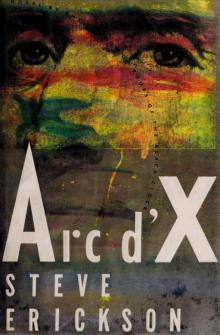 ARC D’X
ARC D’X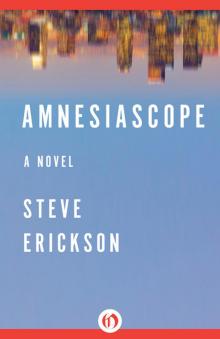 Amnesiascope
Amnesiascope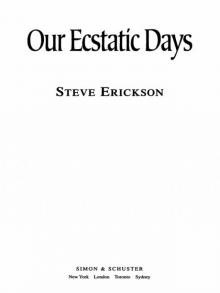 Our Ecstatic Days
Our Ecstatic Days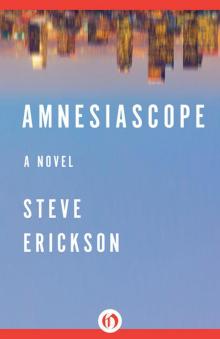 Amnesiascope: A Novel
Amnesiascope: A Novel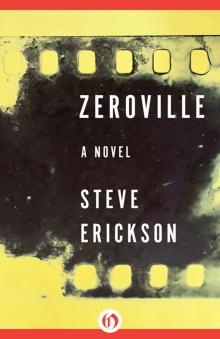 Zeroville
Zeroville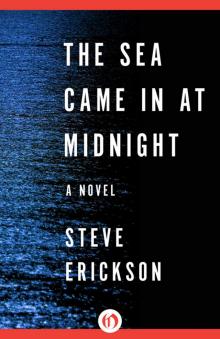 The Sea Came in at Midnight
The Sea Came in at Midnight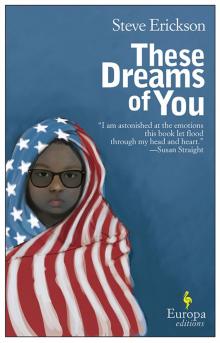 These Dreams of You
These Dreams of You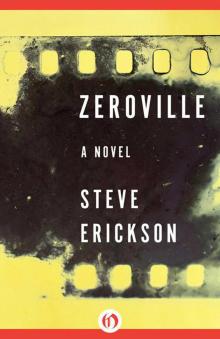 Zeroville: A Novel
Zeroville: A Novel Days Between Stations
Days Between Stations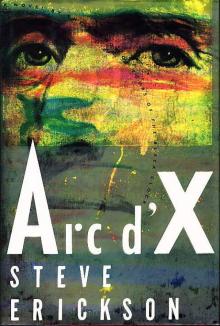 (1993) Arc d'X
(1993) Arc d'X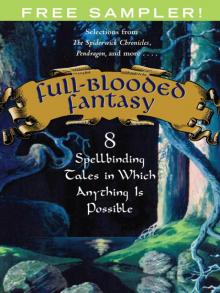 Full-Blooded Fantasy
Full-Blooded Fantasy